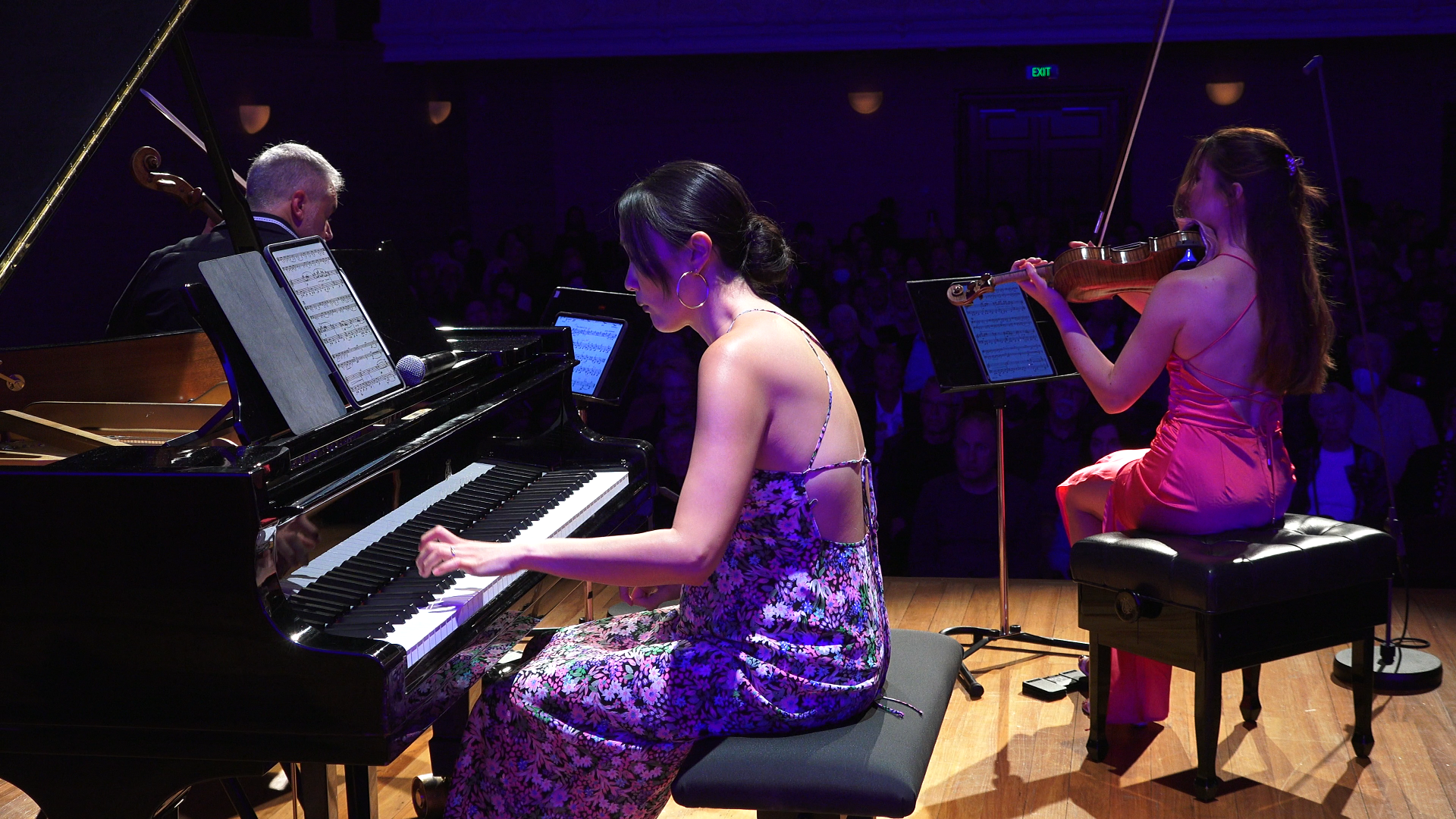Twine was a rich entwining indeed… mingling contemporary and romantic, NZTrio’s trademark talent to combine contrasting genres or threads in one performance. The measure of quality of each of these outstanding musicians was the astonishing ensemble sound, as if the three players had been performing for many seasons together… And this programme gave opportunity for both ensemble playing and virtuosic skill aplenty.
– Clare Martin, Radio 13
The modern multi-arts venue that is Q Theatre in Auckland City was a vibrant setting for NZTrio’s concert last night. The Loft space has a clear acoustic and a black box stage which gave the eclectic programme a touch of theatre without losing intimacy. Twine was a rich entwining indeed… mingling contemporary and romantic, NZTrio’s trademark talent to combine contrasting genres or threads in one performance.
The Trio is presently in transition with two guest artists Amalia Hall and Somi Kim joining Trio cellist Ashley Brown for this series of concerts. The measure of quality of each of these outstanding musicians was the astonishing ensemble sound, as if the three players had been performing for many seasons together… And this programme gave opportunity for both ensemble playing and virtuosic skill aplenty.
I was excited to hear the first offering of the evening, Mishima the last movement from Philip Glass’ String Quartet No. 3, and closing music from the film Four Chapters of Mishima based on the life and work of the Japanese novelist and nationalist Yukio Mishima who brought his life to a violent end with a ritual suicide. It was slightly odd to open a performance with a closing movement and so short, more more I say! But still a fantastic introduction to the evening, an amuse bouche indeed as Brown said.
Performing Glass takes musicians of great technical skill with the repeated rhythms and arpeggios that morph underneath tonal melodies, one step wrong and it becomes nonsense. Kim led the brilliant assault from the piano with strings dashing closely behind. It’s one thing to hear Glass in recordings but seeing it in a live performance makes you appreciate just how brilliant these players have to be.
The next thread after the modern start was the Schumann Piano Trio No.2 in F major played with ebullience and great liveliness, again wonderful voice leading from Kim on piano. Brown’s cello resonated beautifully with great depth of experience and articulation encouraging honeyed phrases from both the strings.
In the third movement of this Trio we were treated to the dulcet soft timbres from Hall on violin marred only by the opening of lozenges in the audience… ah the perils of live performance! Despite that, Schumann’s joy and ardour was articulated with great warmth right to the final bars of the trio.
I’ve decided that the next work, Matthew Hindson’s Rush (1999) acts as a Tardis in this series, for audiences perhaps more used to classical or romantic repertoire. A contemporary Australian composer, Hindson’s works are said to be influenced by modern techno beats and contemporary pop sounds. But in this particular work, he opens a doorway for modern audiences to travel from the romantic era right slap bang into modern day. This work is very much shaped by Mendelssohn’s Octet for Strings (1825), Rush is a brilliant modern ‘cover’ of the final movement of the 19th century Romantic octet. NZTrio introduced this piece as their favourite to play and you could see why… there is repetition just as in the Glass piece but with the manic fun of everyone trying to get their hand in the lolly jar first. It’s an exhilarating nine minute ride with amazing virtuosic opportunities taken with flamboyant zeal by all three players, and here we see the Trio really buzzing with life. It completed the first half with a super dose of fun!
In each programme that NZTrio performs, they include at least one New Zealand composition. Last night was extra special with the premier performance of a new work by young US/NZ composer, Celeste Oram. This performance was one of four new works Oram was having premiered this year and it’s a credit to NZTrio for picking up such a genre-busting composer.
Oram investigates new media and strategies for musical notation using props and audience prompts in this case. The scene for this work titled the naming of waters was a reading in which there is a burial at sea, a ’trio of hired musicians on deck’ and ‘indelicate seagulls’. The players improvised descending scales interspersed with string glissandi like the call of gulls. It brought to my mind the tragic orchestra that reportedly played on as the Titanic went down. There was pouring of sand into a box and the scattering of white flowers into the audience like solemn offerings to the sea.
The audience was asked to write on slips of paper ‘that which they hope will never change’ and these were extolled by the musicians. Quite poetic, until the last random selected slip of paper from the audience was read out – “pineapple lumps” which raised a laugh, a nice bit of Kiwiana! The whole effect was whimsical with moments of melancholic as the audience tuned in to the seriousness of those precious things being lost.
Then once more, NZTrio invited our ears to engage with 19th Century repertoire, this time with the Brahms Piano Trio No.1 in B Major. This work is solid Brahms. Although composed relatively young in the composer’s life in 1854, it was revised a whopping 35 years later. This is great Romantic writing right to the core. The Trio players spread so comfortably into this work… In the hands of a Master of Romantic music, they delivered beautiful stately and passionate phrases. Exquisite unison string sounds in movement one and dazzling catapults down the keyboard in movement two were high points for me. And then a hushed awe spread in the audience as NZTrio unfolded the majestic Adagio of the third movement, full of gravitas and beautiful long phrases. Here was amazingly commanding playing from all three in the Trio, finishing with fabulous drama and a final flourish to warm applause.

